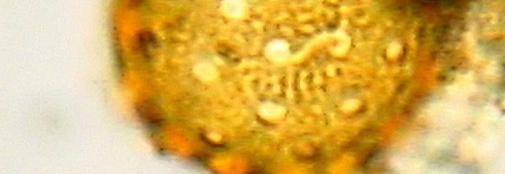Pollen

Pollen Analysis includes the identification and enumeration of pollen, pteridophyte spores, acid resistant planktonic algae, and micro-charcoal. Other less common palynomorphs including dinoflagellates, rotifer and nematode eggs and spores of fungi imperfecti are recorded when present.
Unlike macrofossils, pollen, spores, planktonic algae and microcharcoal are produced and deposited in quantities large enough to make statistically valid inferences about the flora from which they originate.
Pollen from terrestrial sediments including archaeological context often needs to be concentrated from large volume samples using nylon screens and heavy liquid separation. These samples can be used to make inferences about the local environment and prehistoric behaviours including:
- The cultivated plants and weed communities on fields, pastures, secondary forests.
- Plant storage and processing (e.g. threshing, milling, grain, hay and leaf-hay storage )
- The season of abandonment, or burial (sealed contexts).
- In exceptional circumstances infer the ingredients in foods and drinks (gruel, grog etc.)
The SNM lab also focuses on the analysis of pollen sequences taken from stratigraphic contexts, i.e. lakes, moats, bogs, cave sediments and thicker cultural layers that have accumulated over time. These sequences can be combined with XRF scans, sediment and macrofossil analysis. The last of which can provide material for AMS dating and age-depth modelling. Unlike discrete samples taken from archaeological features, these pollen records allow us to infer time transgressive changes in the local or regional landscape.
- Variance in planktonic algae and the pollen of hydrophytes and telmatic plants track the lake’s trophic status (a function of temperature and nutrient influx) and water level.
- Microscopic and macroscopic charcoal flux and be used to infer changes in regional and local fire-history.
Records of appropriate resolution can be used with Landscape Reconstruction Algorithms (LRA) to reconstruct changes in paleo-vegetation.
Contact
Pernille Bangsgaard
Senior researcher
Research: Animal bones
Phone: +45 51 31 79 38
Email: pernille.bangsgaard@sund.ku.dk

Anthony Ruter
Senior researcher
Research: Pollen and Macrofossils
Phone: +45 60 18 67 69
Email: anthony.ruter@sund.ku.dk

